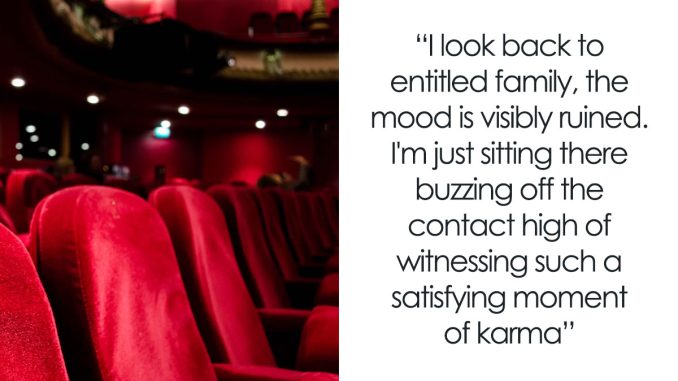
The theater continues to be an important part of our culture, and as Oscar Wilde put it, it’s the greatest of all art forms and the best way for people to share with others what it means to be a human being.
Part of maintaining this experience requires the audience to practice good etiquette, which some completely disregard.
Like this family, who, during intermission, approached seats with coats on them (a sign that they were already reserved), gathered them up, and dumped them on an empty chair in the front. But as we know, karma exists, and their impolite behavior didn’t go unnoticed.
Part of the theater experience requires the audience to practice good etiquette
Image credits: Yiran Ding / unsplash (not the actual photo)
This family completely disregarded this and stole other family’s reserved seats
Image credits: QUI NGUYEN / unsplash (not the actual photo)
Image credits: Kilyan Sockalingum / unsplash (not the actual photo)
Image credits: jdxink
Unassigned seating can cause quite a bit of confusion in theaters
Assigned and, at the same time, unassigned seating in theaters and cinemas has been causing quite a bit of confusion for some time. Many wonder why certain places in the US still don’t have the reservation option, while others refuse to participate in it for various reasons.
As a twentysomething-year-old who grew up and still lives in Europe, this debate baffles me, as unassigned seating was never really an option here. For as long as I can remember, we always had to choose the seats after buying a ticket, or they would already be indicated on it, depending on the availability.
However, in the US, the “trend” of reserved seating has been going around for approximately a decade. Only in 2019 did AMC Theatres, the largest movie chain in the world, allow moviegoers to secure their place beforehand in all of their locations. Taking everything into perspective, that seems quite recent.
Prior to that, in 2013, writer Mark Vanhoenacker published an article called “Movie theater seating: Why don’t American theaters have reserved seating?” voicing his frustrations on the matter. What inspired him to write it was his experience trying to locate empty chairs, but only finding “reserved” ones held with headbands or even laptops.
He acknowledged that this issue wasn’t characteristic of that particular night. “And the worst thing about this cinematic insanity?” he asks, is that it’s seemingly unnecessary. Back in 2013, he hypothesized that having reservations meant that we could choose where we wanted to sit comfortably.
“If it’s busy, you choose your own compromise—in the middle rows but on the side, for example, or a frontish row, but centered. If you have limited mobility, or don’t feel comfortable staggering down a darkened, steeply inclined row, you can reserve an aisle or ground-floor seat,” he added.
He further explained that picking seating in advance eliminates having to arrive very early, stand in a long line, or rush into the theater. You also don’t have to mark your territory with clothing or personal electronics before going to the bathroom or buying a drink. And if you’re going with your friends, you can ensure that you’ll be able to sit together.
Some people are categorically against assigned seating
In response to Vanhoenaker’s piece, writer about movies and TV Keith Phipps published his own in 2015, explaining why we should stop reserving movie theater seating. He explains that it rarely works or saves time, as usually, the first 20 minutes of any given screening involve staff relocating people who are in the wrong seats. “Invariably, no one ends up in the right one, no matter how clear the system. This might change as we get increasingly used to reserved seating, but that still seems a long way off,” he adds.
But even when the system works, he finds it unappealing, as he prefers to choose his seats based on where he’ll be able to watch a movie without distractions. He even has a strategy for what types of people to avoid sitting nearby. This includes “the over 70 patrons,” anyone talking on the phone before a movie begins, and someone who looks likely to text during the film.
Jordan Hoffman from Thrillist published a sympathizing article in 2019 after witnessing his parents getting “burned by unnecessary theater technology.” Reporter James Grebey from Insider reasons that it makes buying tickets with friends a hassle, and chronically late people will know they’ve got a seat waiting for them and won’t worry as much about being on time. “Plus, there’s invariably going to be an awkward moment when someone else is sitting in your assigned seat, and then you have to confront them, and it’s a whole thing,” he adds.
Vanhoenaker argues that the advantages of open seating are mainly beneficial for theater owners. He pointed out that the earlier you arrive, the hungrier and thirstier you’ll get. Since popcorn became popular in theaters during the Great Depression, its prices have increased by 666%, while ticket prices have risen just 66%.
He further explained that arriving in advance means that you’ll watch more commercials. In 2023, cinema advertising spending worldwide was estimated at 2.61 billion U.S. dollars, up from 2.56 billion dollars a year prior.
Commenters were applauding the karma the family got and even shared similar stories
The post Entitled Family Takes Reserved Theatre Seats, Gets Instant Karma first appeared on Bored Panda.
